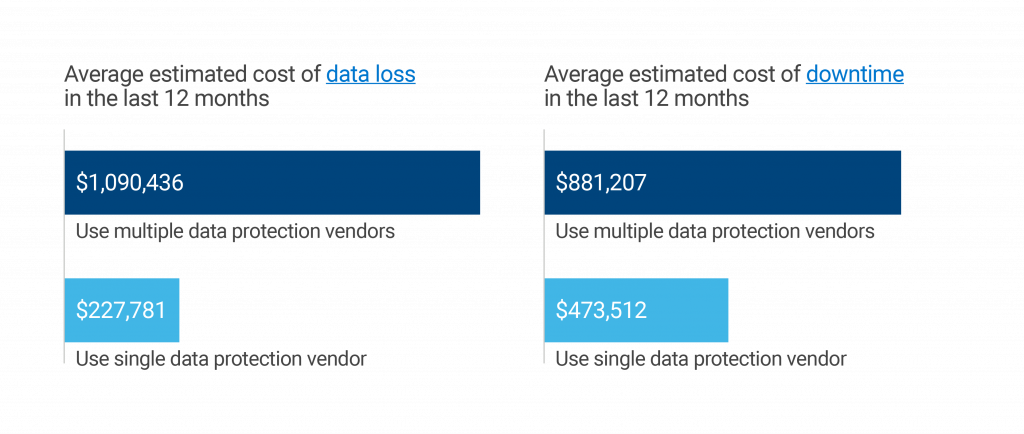Few would argue that organizations are becoming increasingly dependent on data to fuel innovation, drive new revenue streams and provide deep insight into the needs of their customers, partners and stakeholders. Yet despite the increased investments to safeguard data and keep mission-critical application services highly available across multi-cloud environments, we are witnessing a steady uptick in application downtime and data loss across organizations of all sizes. This is resulting in lost revenue, lost employee productivity and lost opportunities.
According to the 2020 Global Data Protection Index (GDPI) snapshot survey, 82 percent of the respondents reported experiencing a disruptive event in the past 12 months – meaning they experienced downtime, data loss or both – up from 76 percent in the 2019 GDPI survey. The average annual costs of data loss in this 12-month period exceeded $1M, slightly higher from the year prior, while the costs of downtime surged by 54 percent, $810k in 2019 vs $520k in 2018.
What’s behind this trend of persistent digital disruption? Certainly, the ongoing proliferation of data and application services across edge locations, core data center and multi-cloud environments is making it very challenging for IT organizations to ensure data is continuously protected, compliant and secure.
Compounding IT complexity is the continued evolution of application services themselves. Organizations are moving toward faster, more agile ways of deploying applications to market – containers, SaaS and cloud-native applications are altering the dynamics of how data is protected.
Likewise, distributed edge technologies like IoT are driving unprecedented data volumes as smart cities, autonomous vehicles, medical devices and sensors of virtually every kind imaginable are capturing troves of information across the digital landscape. In the not-so-distant future, there will be more data residing in edge locations than in all of the public clouds combined – placing inordinate strains on data protection infrastructure and IT teams to efficiently manage, protect and secure this information.
To illustrate how data protection complexity can have an outsized impact on downtime, data loss and their associated costs, consider the following data points from the GDPI research: Eighty percent of the survey respondents reported they were using solutions from multiple data protection vendors. The irony is that these organizations are likely investing more in time, money and staffing resources to protect their data and applications, yet their annual data loss and downtime costs are significantly higher than organizations working with a single data protection vendor.
Eighty percent of the survey respondents reported they were using solutions from multiple data protection vendors. The irony is that these organizations are likely investing more in time, money and staffing resources to protect their data and applications, yet their annual data loss and downtime costs are significantly higher than organizations working with a single data protection vendor.
Moreover, the majority of respondents indicated a lack of confidence in their solutions to help them recover data following a cyber-attack, adhere to compliance regulations, meet application service levels and prepare them for future data protection business requirements. It’s no surprise, then, that two-thirds of organizations are concerned that they will continue to experience disruption over the next 12 months.
To combat data protection complexity, minimize disruption and mitigate the risk of data loss and downtime, organizations need simple, reliable, efficient, scalable and more automated solutions for protecting applications and data regardless of the platform (physical, virtual, containers, cloud-native, SaaS) or of the environments that workloads are deployed into (edge, core, multi-cloud).
These solutions also need to help organizations ensure compliance and enhance data security across hybrid, multi-cloud . And they need to provide the global scale that organizations need as their application workloads and data volumes exponentially increase in the coming years.
By delivering a deep portfolio of data protection solutions that address the need for traditional and modern workloads across edge, core and multi-cloud environments, Dell Technologies provides proven and modern data protection that delivers simplified, efficient, and reliable protection and recovery of applications and data, while ensuring compliance and mitigating the risks of data loss through our integrated cyber resiliency capabilities.
Our industry-leading data protection software and integrated data protection appliances are leveraged by our customers to protect critical data assets on-premises and in the cloud. Today, for example, we are protecting over 2.7 exabytes of data for over 1,000 customers in the public cloud.¹
And we continue to double down on our investments in data protection to deliver the most innovative data protection solutions available in the market. Recently we announced the support for protecting Kubernetes containers on PowerProtect Data Manager, enabling our customers to accelerate innovation by seamlessly protecting critical data deployed in containers.
And this is just the beginning. Our agile development engine is primed to release a steady stream of new data protection capabilities every quarter to enable our customers to protect and safeguard their critical data assets however and wherever they are deployed across edge, core and multi-cloud environments.
As the industry leader in data protection software and integrated data protection appliances, Dell Technologies is committed to delivering the end-to-end, innovative data protection solutions our customers need to eliminate data protection complexity and break the cycle of digital disruption to help them transform now and well into the future.
¹ Based on Dell analysis, February 2020